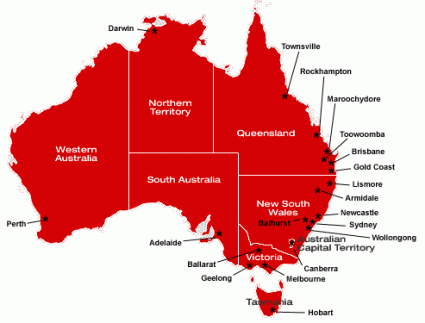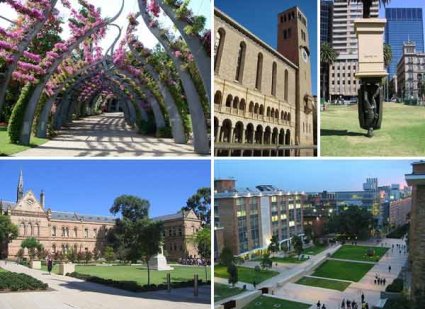Universities and Colleges in Australia
The Australian higher education sector offers a complete range of university courses and programs leading to highly regarded and internationally recognised qualifications. Australia is the destination of choice for students from around the world looking for a quality education at an affordable price.
Learning and studying in Australia is the perfect way to launch your career. Employment opportunities open up to those who have degrees from any one of the universities, whether they study in Sydney, Melbourne, Brisbane, Perth, Adelaide, or at any of the other higher-education institutions located around Australia.
Australian Universities
The Australian universities sector has grown rapidly over recent years. This has included many long established colleges becoming accredited universities and new universities emerging to service an expanding population or a developing location. The dates used in these lists are the dates that the universities gained their accreditation. The dates in parentheses (if any) are the dates the institution was first established prior to becoming an accredited university.
Australian Colleges
The Australian college system is based on vocational education programs that can be used for employment or as the basis for further academic study. A very small number of colleges in Australia can award degrees. These include tertiary institutions that use the name 'College' such as some medical schools and art schools. Along with this the name 'College' is also used by some secondary schools (Years 7 to Year 12 - for students from about 12 years old up until about 18 years old).
Otherwise colleges refers to post-secondary institutions that offer non-degree based qualifications. The programs offered by these colleges can be used as employment-based training and qualifications or to enter one of the universities and in that way achieve a degree-level qualification.
Most of the publicly funded colleges come under the control of the various state governments which administer the TAFE sector of higher education. TAFE, or Technical and Further Education, has grown rapidly over recent years as students seek a combination of vocational education and a stepping stone into degree-level studies at university. Many TAFE colleges use the name 'Institute' rather than 'College' to differentiate themselves from secondary-level colleges.
After the diploma and advanced diploma levels a student may be eligible for entry into a university and may also be eligible for credit, in some cases full credit for work already completed.
Australian Colleges are therefore an excellent choice for students who want to get real experience in the vocation of their choice before they either commence employment or pursue further university-level studies
For more information, please write to us at StudyAustralia EU <- click for e-mail

- > Australian National University - ANU College, Canberra
- > Charles Sturt University, Brisbane, Melbourne, Sydney
- > Flinders University International Study Centre, Adelaide, South Australia
- > James Cook University (Queensland)
- > Southern Cross University, New South Wales and Queensland
- > University Preparation College (UPC), Bankstown, New South Wales

2013 ARWU SHJT Shanghai Jiao Tong University China Academic Ranking of World universities - Australian universities ranking:
Good news for the University of Melbourne with a three position change from 57 in 2012 to 54 in 2013 to consolidate its position as the number one ranked Australian University according to the ARWU. Other improvers at the top end are the University of Queensland moving from position 90 to position 85, and the University of Western Australia (UWA) moving from 96 to 91. UWA's move up the rankings also sees it move from 5th to 4th in the Australian rankings, leapfrogging the University of Sydney which drops from 4th to 5th in the Australian rankings while also dropping four places in the World Rankings from 93 to 97.
Australia as a whole maintains the same nineteen universities in the top 500 as last year, and the same five universities in the top 100.
2013 THE Times Higher Education World University Reputation Rankings - Australian University Rankings
Australia now has six universities in the Times Higher Education (THE) World Reputation Rankings 2013 top 100, up from four in 2012 with Monash University and UNSW joining the University of Melbourne, Australian National University, Sydney University, and the University of Queensland.
Only the US and the UK have more universities in the top 100 of the THE World Reputation Rankings now that Australia has moved ahead of Japan, Germany, and the Netherlands with its two new entrants.
The 'Reputation Rankings' system is based on the the results of over 16,000 responses from senior academics in 150 countries. It began in 2011 so that Times Higher Education couild release two world university rankings each year rather than the single rankings report released annually by its competitors. The THE 'Reputation Rankings' joins its 'Academic Rankings' which are released around the start of October each year but they have been criticised for their obvious anglo bias in asking mainly western educated and socialised academics working at western universities which universities they consider to be the best in the world.
2012 QS World University Rankings - Australian university rankings.
Some good news for the Australian university rankings with the 2012 QS World University Rankings reporting a new entry from amongst the top Australian universities. The private Bond University has moved into the top 700 institutions at 380 in the world rankings after scoring impressively in a number of dimensions, mainly attributed to its smaller class size and the internationalised character of the staff and students. The ANU led the best Australian universities in the rankings with its strong research focus. All the Group of Eight universities scored well although there was some movement both up and down. The international rankings are now becoming much more competitive as more and more universities around the world start to focus their strategies, resources, and activities on obtaining the highest possible score across the different dimensions. It will be interesting to see how this plays out in the years ahead.


